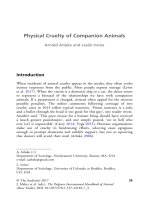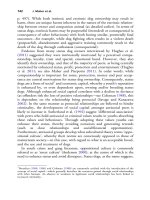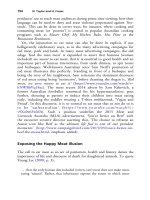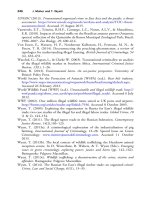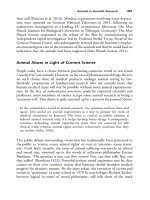The palgrave international handbook of a 149
Bạn đang xem bản rút gọn của tài liệu. Xem và tải ngay bản đầy đủ của tài liệu tại đây (26.93 KB, 1 trang )
140
J. Maher et al.
March 2016, 74 dogs were seized in London boroughs of which 15 were
destroyed. Other police forces in England and Wales release some of the
same data sporadically, often as a result of a Freedom of Information
(FOI) request (McCarthy 2016).
2. DEFRA maintains the Index of Exempted Dogs, which has been documented by the media as including 3,001 pit bulls, half a dozen dogo
Argentinos and three Japanese tosas. A further 156 applications are being
processed (Lyons 2015).
3. Local authorities record the number of stray dogs they collect and
subsequently euthanise and this data should be available by FOI
requests, but not centrally published. Each year the Dogs Trust surveys
(via FOI) all local authorities throughout the UK to establish the state
of the nation’s stray dog problem. The last survey findings available are
that in 2014–2015 there were 102,363 stray dogs collected by local
authorities of which 5,142 were put to sleep. However, the breed is not
identified.
4. Abandoned dog totals are recorded annually by the RSPCA using its own
kennel data and data from local councils. They report on this annually,
but again not detailing specific breeds. Other NGOs record and publish
breeds specific data. For example, Battersea Dogs Home (Blunden 2014)
reported that in 2014 bull breeds accounted for almost half of dogs
entering their shelter. It is impossible to establish how many were ‘status’
dogs.
5. Dog fighting injuries have been recorded annually in the RSPCA London
hospital, but not regularly published.
6. Court statistics and RSPCA data on convictions, calls, complaints and
rescues on animal abuse more generally are available (see Pierpoint and
Maher 2010), and the former identifies dogs as the most common animal
victim, with neither recording offender characteristics.
7. Dog bite or strike statistics are available on human victims from the Royal
Mail and NHS, however these do not record the dog breed or outcome for
the dog involved (dogs are commonly reported in the media to have been
destroyed). For example, according to the Royal Mail (2016), 2960 postmen and women were attacked between April 2014 and April 2015. The
number of NHS consultations relating to dog bites/strikes are recorded
annually, but such data, itself an incomplete picture, is only published
periodically. A recent study in Wales identified an average of 114 child
(aged under 18 years) admissions for dog bites/strikes per year, with an
upwards trend in admissions over the past decade (from approximately 85
per year in 2003—Humphreys et al. 2014). Interestingly, they also indicate
